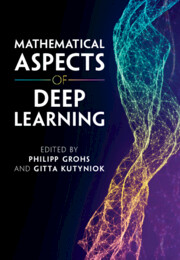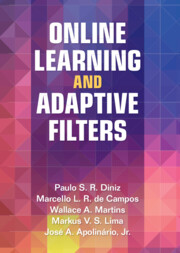Refine search
Actions for selected content:
6791 results in Communications and signal processing
23 - Variance-Reduced Methods II: Random Reshuffling
-
- Book:
- Inference and Learning from Data
- Published online:
- 17 February 2023
- Print publication:
- 22 December 2022, pp 816-851
-
- Chapter
- Export citation
Dedication
-
- Book:
- Inference and Learning from Data
- Published online:
- 17 March 2023
- Print publication:
- 22 December 2022, pp v-vi
-
- Chapter
- Export citation
Dedication
-
- Book:
- Inference and Learning from Data
- Published online:
- 17 February 2023
- Print publication:
- 22 December 2022, pp v-vi
-
- Chapter
- Export citation
3 - Expressivity of Deep Neural Networks
-
-
- Book:
- Mathematical Aspects of Deep Learning
- Published online:
- 29 November 2022
- Print publication:
- 22 December 2022, pp 149-199
-
- Chapter
- Export citation
6 - Adaptive Filtering on Graphs
-
- Book:
- Online Learning and Adaptive Filters
- Published online:
- 24 November 2022
- Print publication:
- 08 December 2022, pp 198-249
-
- Chapter
- Export citation
Contents
-
- Book:
- Online Learning and Adaptive Filters
- Published online:
- 24 November 2022
- Print publication:
- 08 December 2022, pp v-viii
-
- Chapter
- Export citation
Preface
-
- Book:
- Online Learning and Adaptive Filters
- Published online:
- 24 November 2022
- Print publication:
- 08 December 2022, pp ix-xii
-
- Chapter
- Export citation
5 - Adaptive Beamforming
-
- Book:
- Online Learning and Adaptive Filters
- Published online:
- 24 November 2022
- Print publication:
- 08 December 2022, pp 152-197
-
- Chapter
- Export citation
Frontmatter
-
- Book:
- Online Learning and Adaptive Filters
- Published online:
- 24 November 2022
- Print publication:
- 08 December 2022, pp i-iv
-
- Chapter
- Export citation
Index
-
- Book:
- Online Learning and Adaptive Filters
- Published online:
- 24 November 2022
- Print publication:
- 08 December 2022, pp 250-253
-
- Chapter
- Export citation
Acknowledgements
-
- Book:
- Online Learning and Adaptive Filters
- Published online:
- 24 November 2022
- Print publication:
- 08 December 2022, pp xiii-xiv
-
- Chapter
- Export citation
3 - Kernel-Based Adaptive Filtering
-
- Book:
- Online Learning and Adaptive Filters
- Published online:
- 24 November 2022
- Print publication:
- 08 December 2022, pp 60-108
-
- Chapter
- Export citation
Introduction
-
- Book:
- Online Learning and Adaptive Filters
- Published online:
- 24 November 2022
- Print publication:
- 08 December 2022, pp 1-15
-
- Chapter
- Export citation
4 - Distributed Adaptive Filters
-
- Book:
- Online Learning and Adaptive Filters
- Published online:
- 24 November 2022
- Print publication:
- 08 December 2022, pp 109-151
-
- Chapter
- Export citation
2 - Adaptive Filtering for Sparse Models
-
- Book:
- Online Learning and Adaptive Filters
- Published online:
- 24 November 2022
- Print publication:
- 08 December 2022, pp 16-59
-
- Chapter
- Export citation

Mathematical Aspects of Deep Learning
-
- Published online:
- 29 November 2022
- Print publication:
- 22 December 2022

Online Learning and Adaptive Filters
-
- Published online:
- 24 November 2022
- Print publication:
- 08 December 2022
5 - BeiDou B1I Receiver Processing
-
- Book:
- GNSS Software Receivers
- Published online:
- 28 October 2022
- Print publication:
- 17 November 2022, pp 153-163
-
- Chapter
- Export citation
Foreword
-
- Book:
- GNSS Software Receivers
- Published online:
- 28 October 2022
- Print publication:
- 17 November 2022, pp xiii-xiv
-
- Chapter
- Export citation
12 - SDR MATLAB Package
-
- Book:
- GNSS Software Receivers
- Published online:
- 28 October 2022
- Print publication:
- 17 November 2022, pp 302-319
-
- Chapter
- Export citation
